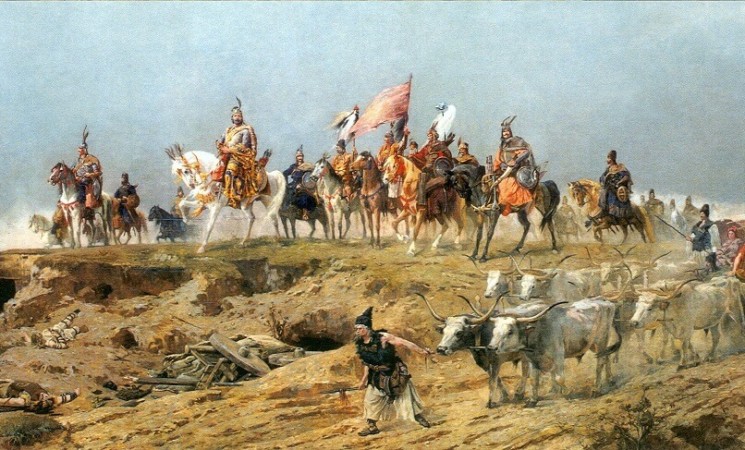Some people quite regularly complain about Medieval Stasis in fantasy worlds, with swords, armor, and castles that are thousands of years old looking just the same as those made in the present day. Which I guess is fair to some point, but on the other hand, we actually get to see these ancient things only very rarely. Who is actually saying that things thousands of years in the past looked exactly as medieval as in the present?
Something that has been bothering me much more recently is how lots of fantasy worlds seem to portray countries and governments in a very static way. The same peoples living in the same places for many centuries or thousands of years, with borders rarely changing in any meaningful way. Which is not at all how kingdoms and empires progressed historically. As historians like to frequently repeat, the idea of a nation state is a very recent concept. But there is also the old story of “medieval people rarely went more than 30 km from their home in their entire life”. Which again might be fair to some point, since most people were farmers and as such wouldn’t commonly move to a different city for a new job. But when local circumstances made it necessary or desirable to give up the old farm and set up a new one somewhere else, then on many occasions they really would move astonishing distances.
 Even though I’m quite a fan of Bronze Age history, the periods that really have been fascinating me the most in recent years are the conquest of the Persian Empires by Greeks in the 4th century BCE and the Migration Period of late Antiquity and the early Middle Ages from the 4th to 6th century CE. Well over 2000 years ago, you had Greek aristocrats being the ruling class in Afghanistan. 600 years later, a group of Scandinavians who were living on the Black Sea went on a campaign that made their sons and grandsons kings in Tunesia after conquering Spain. In 5th century France, warlords from Denmark and Kazakhstan were trying to carve out pieces of the Roman Empire for themselves.
Even though I’m quite a fan of Bronze Age history, the periods that really have been fascinating me the most in recent years are the conquest of the Persian Empires by Greeks in the 4th century BCE and the Migration Period of late Antiquity and the early Middle Ages from the 4th to 6th century CE. Well over 2000 years ago, you had Greek aristocrats being the ruling class in Afghanistan. 600 years later, a group of Scandinavians who were living on the Black Sea went on a campaign that made their sons and grandsons kings in Tunesia after conquering Spain. In 5th century France, warlords from Denmark and Kazakhstan were trying to carve out pieces of the Roman Empire for themselves.
Now it seems unlikely that the entire populations of whole countries suddenly packed up everything and started walking for several thousand miles. With the Greek conquest of the Persian Empire, it was explicitly an army on campaign that was recruiting new additional forces from the local rulers who switched to their side. In the migration period of Europe, migrating groups are estimated to consist of only 10 to 20,000 people each, with the total number of people on the move over several centuries probably being well under a million. The German term of “Peoples Marches” for the period is somewhat misleading in that way. You didn’t have entire populations exchanging the places where they lived. Most of the peasant population would likely have remained the same while it was the warrior elites who claimed rulership over the land which in some cases would change every few decades. But when you want to ask “Where did the Visigoths live?”, you have to include the specific year. And I am pretty sure that over in the East, there were some warlords who did major conquests in both China and Europe during different times of their lives. Which then didn’t hold very long after, but that only shows even more how extremely fluid things were in regards to who rules what places.
Yes, in many ways, the world is much smaller now than it was even just one or two centuries ago. But it was never actually that big to begin with. When creating a history for fantasy worlds, consider that not just kings come and go, but the peoples who inhabit the various countries do as well.

I think this is well hinted at in the various editions of (A)D&D as the idea that a character around 9th level, usually a fighter, sets up a new castle on the edges of some barony and attracts people to him. The in-game connotation feels more permissive, but it could just as easily be “I’m putting my castle here and you can’t stop me.”
You don’t even need to be 9th level to do that.
But a keep and a few dozen farmers don’t make a new nation yet.
Sometimes people were invited to settle particular areas such as when German and Dutch peasants were invited to settle in Central and Eastern Europe (modern day Czech, Poland and the Baltic nations) during the Middle Ages.
Well, they were “invited” by the German conquerors who had just subjugated the local population.
The Greeks had done that as well. A Greek minority ruling Afghanistan for several centuries in early Antiquity is one of my favorite oddities in history. It just seems really out of place.